Welcome to The Famous Thursday Post!
Our focus on Thursdays is on songwriting, recording, production and commercial release. So…
Last week we talked about conveying emotion in lyrics when songwriting. I mentioned the old saying “Heartbreak sells”. Should you only write heartbreak and lost love songs? Of course not. Should you also write of things that are close to your heart and emotions and experiences? Yes, of course!!
But are those your only choices? Nope, IMHO. Emotional connection with the people you’re hoping to reach in songwriting is definitely a two way street. Maybe even a 12 way superhighway cloverleaf interchange or something. Your listener’s responses may be going in as many unintended directions as there are directions. Should you try to guide listener impressions, or let the chips fall where they may? Tough question and both options can be difficult to answer. In addition to your songs’ lyrics, consider rhyming structures, syllable counts, and how those things impact melody and harmony decisions, as they’ll each (and all in combination) influence to some extent the emotions you wish to convey. For example, it’s pretty easy to objectively see where Mr. Bobby McFerrin was going with his song, “Don’t Worry, Be Happy”. Let’s see how that went…
"Don't Worry, Be Happy" is a 1988 song by American musician Bobby McFerrin, released as the first single from his fourth album, Simple Pleasures (1988). It was the first a cappella song to reach number-one on the Billboard Hot 100 chart, a position it held for two weeks….
At the 1989 Grammy Awards, "Don't Worry, Be Happy" won the awards for Song of the Year, Record of the Year, and Best Male Pop Vocal Performance.
Pan-European magazine Music & Media picked it as Single of the Week. They wrote, "Cool acapella by this unusual artist. Uncomplicated music stripped down to the basics, but missing absolutely nothing. This recording will appeal to everybody who is on the lookout for something different. With the reggae-style vocals and a snappy rhythm, this Linda Goldstein produced US top 10 single is a novelty record of considerable substance."[16]”
(Ed. So far, so good, but…)
However, in 2011, "Don't Worry, Be Happy" was named as the worst song of all time by Village Voice critic Michael Musto,[21] and it topped Q100 DJ Bert Weiss's list of tracks he would forever ban from radio.[22] In the "50 Worst Songs Ever", Blender said that "it's difficult to think of a song more likely to plunge you into suicidal despondency than this", and also lambasted its "appalling" lyrics.[23]
In late 1988, Miami, Florida, television station WTVJ (channel 4) commissioned McFerrin to record a customized version of the song with lyrics promoting WTVJ's network affiliation switch from CBS to NBC on January 1, 1989, as part of a complicated six-station affiliation shuffle in South Florida.[24][25] The station's usage of the song was so infamous that when WTVJ's general manager resigned in 1993, South Florida Sun-Sentinel critic Tom Jicha wrote, "The 'don't worry, be happy' era is officially over at WTVJ ... Practically speaking, it was over as soon as it started. The jingle ... never reflected reality ... there has been little to smile about and plenty to fret over."[26]”
Credit: Wikipedia Don't Worry, Be Happy
So. Is there a lesson here? Maybe, but maybe not. Mr. McFerrin can justly point to the awards and positive reception the song received. Should he revise his approach to songwriting and singing based on either the accolades (Do more of the same!) or criticism (Don’t ever do this again!)? Should he ignore either? Or both?
As you can guess, those are rhetorical questions. Mr. McFerrin is a highly successful musician, his choices reflect that, regardless of detractor’s opinions. I have no critique of the song at all and I remember it as a sort of happy song, a bit pop, with a reggae edge and I would certainly not make any recommendations to Mr. McFerrin about his music.
Less rhetorical and for the rest of us, my humble opinion is best expressed as a question: What is our goal?
Goals might be “I want to sell songs”, “I want to be a successful recording artist and performer”, “I want my songs to be in movies or on television”, “I want others to cover my songs and pay me royalties”, or even, “I don’t care, I don’t worry, and I’m gonna be happy!”
I think every one of those potential goals, and probably others I didn’t think of, are valid. More on that below.
First, let’s see how Mr. McFerrin did with syllable counts and the rhyming scheme. Result: all over the place, sorta.
So sorry! - I’m so near “email length” I’m only able to insert a link to the lyrics for “Don’t Worry, Be Happy”:
Link> Don't Worry, Be Happy Lyrics But if you can, please click the link in order to see what I’m talking about in this next bit…
The rhyme scheme is, well, varied…. Some perfect rhymes in the verses - wrote/note, head/bed are examples. The hook/choruses don’t even attempt to rhyme, except with themselves as they simply repeat.
Same with the syllable count. We’ve talked about counting syllables before, today’s links below give some different perspectives on what that means and how syllable counts are useful.
You can count them, I did, and the verse lines more or less center around a 7, 8, or 9 syllable count. The hooks, both embedded in the verses and as the totality of the choruses, are all 6 syllables total, 2 lines with three syllables each line, repeated throughout. I’m usually not a big fan of overly repeated lyrics, but this song even makes that work pretty well. The ending hooks of the verses vary a bit, and I’m especially fond of songwriting that changes things a bit, melodically, harmonically and/or lyrically, in the bridge and choruses. Verses are meant to change and vary, but there you can also play around with, as Mr. McFerrin does in this song, how the hook is used.
So, is it a swing rhythm because it’s reggae influenced? (See links below for straight vs swing/swung musical rhythms).
Yeah, I dunno either…maybe it’s something completely different… The YouTube video of the song has some additional, perhaps improvisational lyrics. Keep in mind this is “more or less” a reggae song. Mr. Ferrin is considered by some to be a jazz influenced vocalist, with “Don’t Worry, Be Happy” being a “one off” - just “sort of” reggae, and kinda jazz influenced. So. The vocals were all sung by Mr. McFerrin acapella - there was some accompaniment - melodic, harmonic, percussive - overdubbed later, but none of those overdubs were musical instruments:
“The "instruments" in the a cappella song are entirely overdubbed voice parts and other sounds made by McFerrin, using no instruments at all; McFerrin also sings with an affected accent, though he stated that "I hate to go so far as to say it's Jamaican. It was heavily influenced by Juan's Mexican Restaurant, which was just around the corner from the studio."[13] "Don't Worry, Be Happy" is written in the key of B major.[14]”
Ibid: Wikipedia
That doesn’t mean the song can’t be covered - Chordify has a “chord chart”, and you could recreate it, but that said, there’s no actual guitar part in the original song. It’s just vocals.
So, Key Of BMajor, 4/4 time, 136 BPM - but keep in mind instrumental based covers (no matter what instrument is used) are only going to substitute for the actual vocally created sounds of the original. You can find a chart on Chordify, and probably Ultimate Guitar.
So where am I going with all of this? Kinda back to last week - you can certainly write songs for yourself that make you happy, sad, nostalgic, angry, moping about over lost love, or any other emotion. Catharsis is a perfectly reasonable goal in songwriting. Will catharsis by itself sell? I can’t answer that, maybe it’ll be a hit - certainly some of the songs by Fleetwood Mac that had roots in the band’s personality (and other) conflicts, sold, and sold BIG. Some of those were undoubtedly cathartic (even, or maybe especially, vengefully so) for their writers. Still, they weren’t all so completely personal that they couldn’t resonate with their listeners on some level and at least to some extent. In each there was at least some element of empathy for their listeners, even if it was only to sorta say “Hey, this isn’t just ALL about me and Stevie, it could be something else!.…..Maybe…or, whatever...”
Fleetwood Mac and its members were already well established and popular, both the band itself and its members. Chances are if you’re reading this Substack, you’re probably not quite as musically established or popular, just sayin’….yeah, me either…
So empathy, the notion of putting yourself at least a bit into the listener’s place as you write, and then accounting to some extent for the fact that your listeners will have their own role, even if for them imaginary, in your song is an important part of songwriting - at least songwriting with goals other than only personal catharsis. As always, your mileage may vary….
New Space Saving Disclaimer!: This Substack, (not just the first one!) is free, always will be, none of the people or companies or products I link to or write about pay me a damn thing. Neither do you unless you buy my song(s) (See what I did there?). Some stuff may be copyrighted by somebody else…whatever. “Fair Use” doctrine for “educational purposes” (Link: Fair Use) applies, suckers! No stinkin’ AI here unless it’s in something I link to. So.
Michael Acoustic
Today’s musician’s quote:
“If I can bring joy into the world, if I can get people to stop thinking about their pain for a moment, or the fact the tomorrow morning they're going to get up and tell their boss off... then I'll be successful.” - Bobby McFerrin
Credit: Bobby McFerrin Quotes (Ed. Lots of good ones here…)
Some “Biz” Links for today:
From a conversation on Reddit - examples of “Straight” and “Swing/Swung” songs
Straight and Swing/Swung Rhythms
Counting, Syllables and Meter:
Perfect and Imperfect Rhymes (Note: if I’m writing and stuck a bit on a rhyme scheme, my go-to is WordHippo)
A couple of videos - (I admit I love British accents, though I’m sure they’d say something like, “Ungrateful Colonist! - whatcher talkin’ bout, ‘accent’, yer wanker?”) watch the first one, well, first, in order to understand the second one - it’s the UK and US difference between the names of musical notes:
If you’ve got that, this one is a nice explanation of Straight and Swing Rhythm.
Some memes and stuff: Yes, it’s a bunch more on modes and stuff, cuz we’re going to talk about that again tomorrow

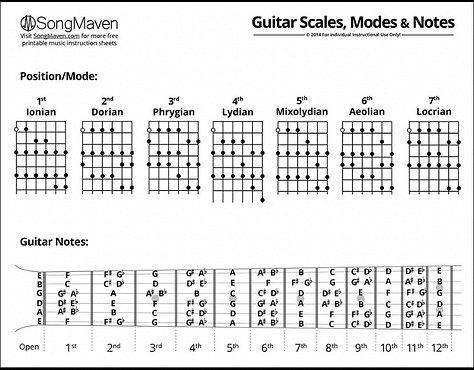
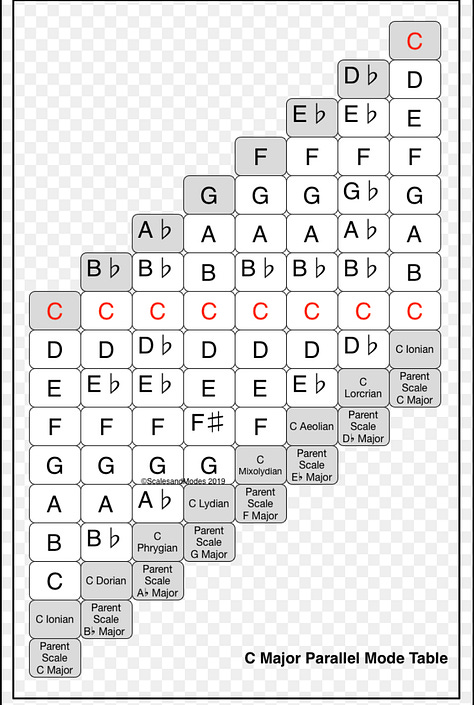
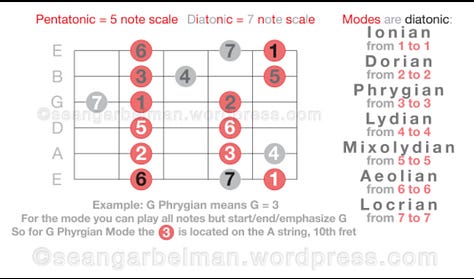
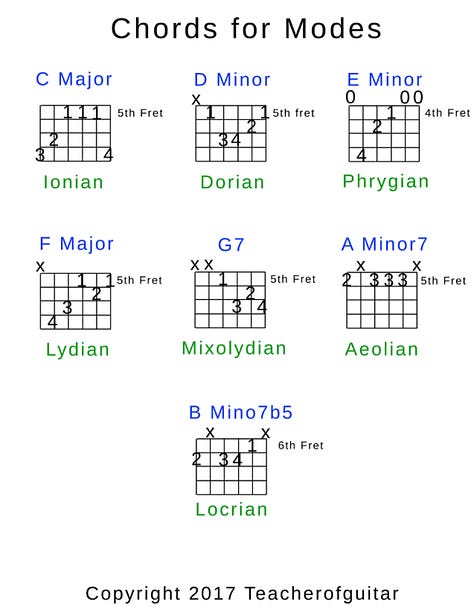
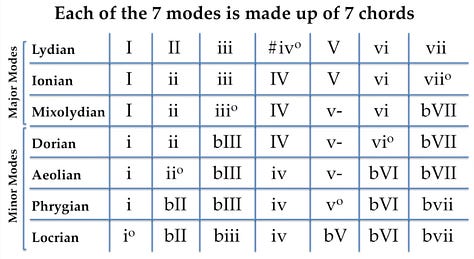
Shameless Self Promotion Section:
My song is out! “Long Road Back” (click on link for streaming options)
Odds and Ends: A bit different than the usual stuff here:
I’ve made no secret of the fact that I’m an absolute fanboi (old fan man?) of Dire Straits. So:
Whatever happened to Pick Withers (original drummer for Dire Straits)?
Also, I saw something that “Dire Straits” may have a gig of some kind in Germany in October. Not sure if that’s some sort of “tribute band” or the real deal.
Anyone know?
Cheers, and keep playing!
Michael Acoustic
“It’s never really final - you just run out of things you can bear to change…”


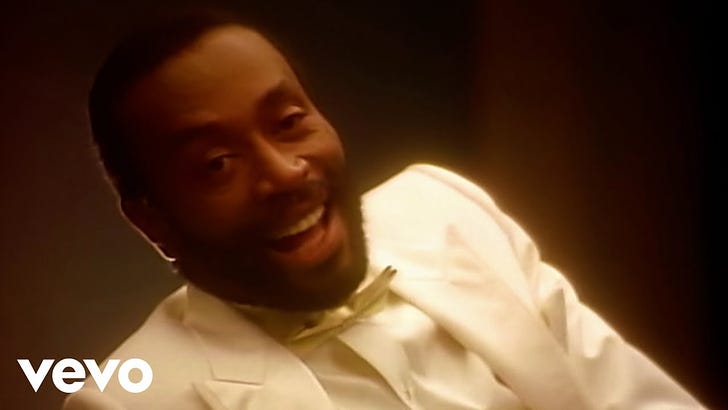


Very wise advice. The “goal” point you made is spot on. Thanks for such a great piece and sharing your knowledge with us!